In our previous blog post we had discussed about What is Dependent Picklist in Salesforce. In these blog post we discuss about What is Formula in Salesforce
Contents
- 1 What is Formula in Salesforce
- 2 Introduction to Formulas in Salesforce:-
- 3 What are Formulas?
- 4 Components of Salesforce Formulas:-
- 5 Creating and Using Formulas in Salesforce:-
- 6
- 7 formula field can explore more formulas like this :-
- 8 Tips and Tricks for Mastering Formulas in Salesforce:-
- 9 Conclusion:-
- 10 FAQs
What is Formula in Salesforce
Introduction to Formulas in Salesforce:-
Salesforce is a powerful tool that helps businesses manage their customer relationships efficiently. One essential feature of Salesforce is its ability to create formulas, which allow users to perform calculations, manipulate text, and
automate tasks within the platform. Understanding how to leverage formulas in Salesforce can significantly enhance your organization’s productivity and data management capabilities.
What are Formulas?
Formulas in Salesforce are expressions that perform calculations, manipulate data, or output text values based on certain conditions. These formulas can be used in various aspects of Salesforce, such as formula fields, validation rules, workflow rules, and reports. They provide a flexible way to customize and automate processes to meet specific business requirements.
Components of Salesforce Formulas:-
Data Types in Formulas:-
- Text Data Type: Used for manipulating and combining text values.
- Numeric Data Type: Allows for mathematical calculations with numbers.
- Date Data Type: Handles date and time values for calculations.
Operators in Formulas:-
- Arithmetic Operators: Addition, subtraction, multiplication, and division.
- Comparison Operators: Equal to, not equal to, greater than, less than, etc.
- Logical Operators: AND, OR, NOT for evaluating multiple conditions.
Functions in Formulas:-
- Text Functions: UPPER, LOWER, CONCATENATE for text manipulation.
- Date Functions: DATE, YEAR, MONTH for handling date values.
- Logical Functions: IF, AND, OR for conditional logic.
Creating and Using Formulas in Salesforce:-
Formula Field Creation:-
To create a formula field in Salesforce, navigate to the Object Manager, select the object you want to add the field to, and choose the Formula data type. Then, you can write your formula using the appropriate syntax and test it before saving. It’s crucial to validate formulas to ensure they work as intended.
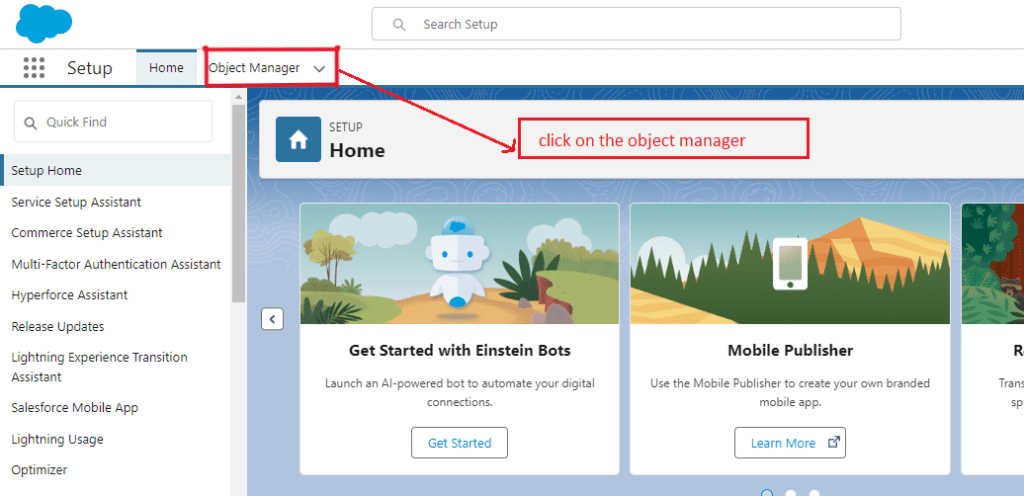
Double click on the required object(opportunity).
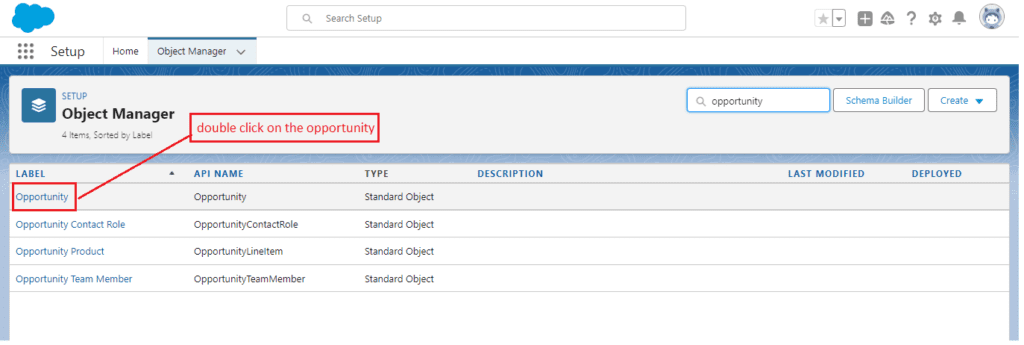
select formula field.
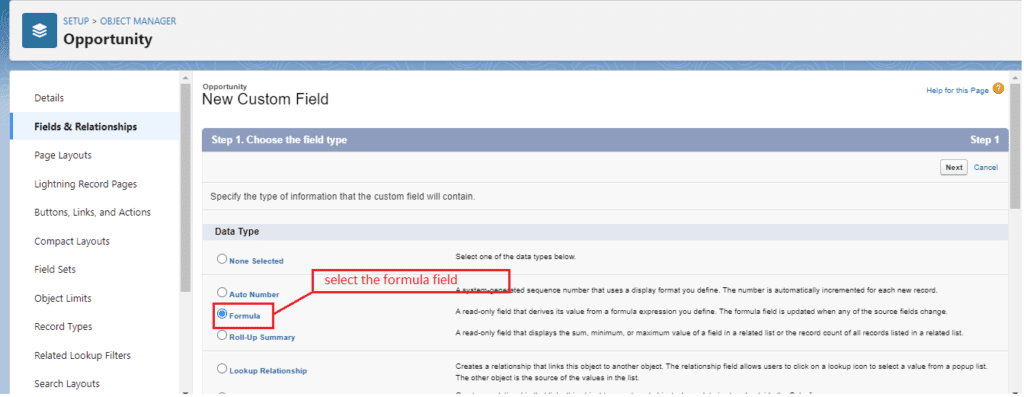
Write a formula at below block.
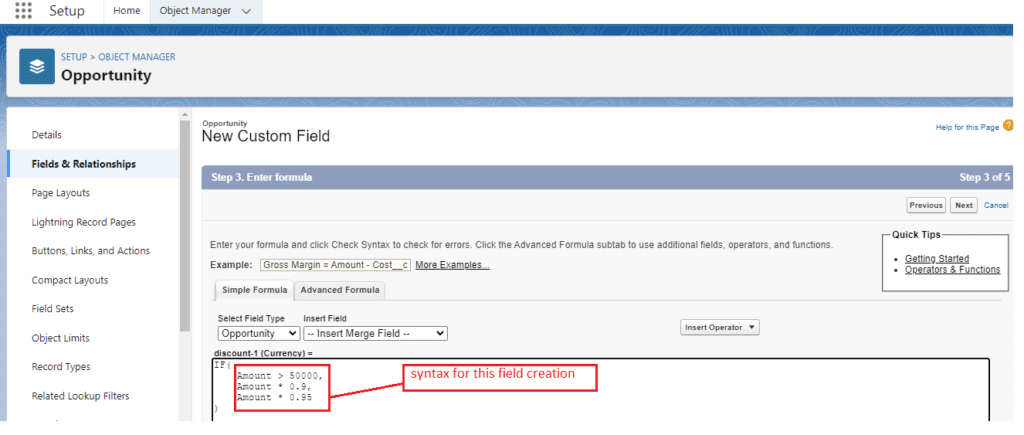
This is the final out put of the below figure shows
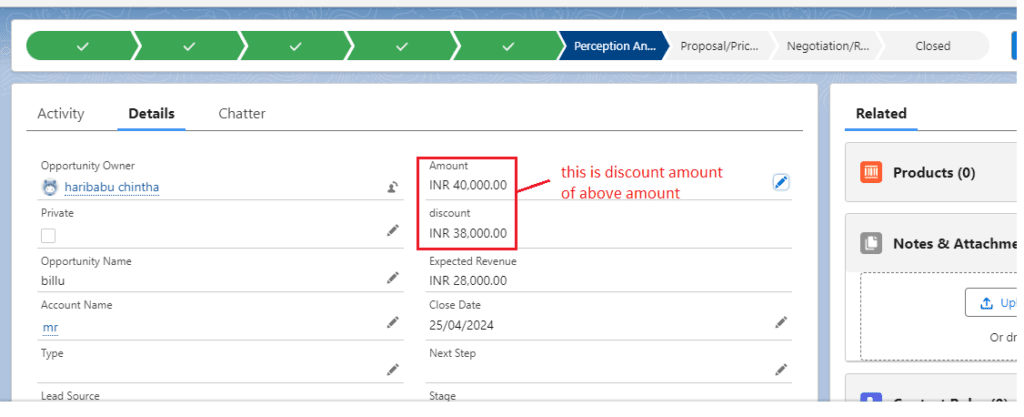
You want to know more about the What is Formula in Salesforce click here
formula field can explore more formulas like this :-
checkbox :-
Formulas returning checkbox values generate true/false(or)checked/unchecked results based on specified conditions.
Example:-
IF(StageName = “Closed Won”, TRUE, FALSE)
Currency:-
Formulas returning currency values generate monetary amounts. They perform calculations involving currency fields and return currency results.
Example :-
Amount * (1 – Discount)
Date :-
Formulas returning dates generate date values. They can perform date manipulation, calculate differences between dates, or derive dates based on other criteria.
Example :-
TODAY() – CloseDate
Date/Time:-
Formulas returning date/time values generate timestamps including both date and time components.
Example:-
NOW()
Number:-
Formulas returning numbers generate numerical values. They perform mathematical calculations and return numeric results.
Example:-
UnitPrice * Quantity
Percentage:-
Formulas returning percent values generate percentage values. They calculate percentages based on specified criteria.
Example:-
(ClosedWonOpps / TotalOpps) * 100
Text :-
Formulas returning text generate string values. They can concatenate text, convert other data types to text, or manipulate strings.
Example:-
FirstName & ” ” & LastName
you want know more about the What is Formula in Salesforce click here
Use Cases of Formulas :-
- Calculating Fields: Use formulas to perform calculations on fields and display results dynamically.
- Displaying Conditional Information: Show specific text or values based on predefined conditions.
- Automating Business Processes: Create automation rules using formulas to streamline workflows.
Best Practices for Formulas:-
- Keeping Formulas Simple: Avoid overly complex formulas to improve readability and maintainability.
- Documenting Formulas Properly: Add comments and descriptions to explain the purpose of each formula.
- Regularly Reviewing and Updating Formulas: Keep an eye on changes in business requirements and update formulas accordingly.
Tips and Tricks for Mastering Formulas in Salesforce:-
Utilizing Salesforce Resources:–
- Trailhead Modules: Salesforce offers free online modules to help you learn about formulas and other features.
- Salesforce Community Forums: Engage with other users to get tips, tricks, and practical insights.
- Webinars and Training Sessions: Attend virtual events to deepen your knowledge and skills.
Exploring Advanced Formula Features:-
- Hierarchical Relationships: Calculate values based on parent-child relationships.
- Cross-Object Formulas: Access fields from related objects in your formulas.
- Real-Time Calculations: Use real-time formulas to perform calculations instantly.
Troubleshooting Formula Errors:-
- Common Formula Errors: Understand common mistakes like syntax errors or incorrect function usage.
- Debugging Techniques: Use debugging tools to identify and fix issues in your formulas.
- Seeking Help from Salesforce Support: Don’t hesitate to reach out to Salesforce Support for assistance with complex formula problems.
Conclusion:-
In conclusion, understanding formulas in Salesforce is essential for maximizing the platform’s capabilities and optimizing your business processes. By mastering the components of Salesforce formulas, creating effective formulas, and following best practices, you can significantly enhance your Salesforce experience and drive business growth.
In our next blog post we will discuss about
FAQs
- Can I use formulas in Salesforce to automate tasks?
- Yes, formulas can be used to automate calculations, updates, and other tasks in Salesforce.
- Are there any limitations to the complexity of formulas in Salesforce?
- While Salesforce formulas are powerful, complex formulas can impact performance. It’s important to keep formulas efficient and well-structured.
- How can I become proficient in creating effective formulas in Salesforce?
- Practice, explore advanced features, leverage resources like Trailhead and community forums, and actively troubleshoot formula errors to improve your skills.
Remember, formulas in Salesforce are a valuable tool that can help you streamline processes, improve data accuracy, and drive business success. Embrace the power of formulas and unlock the full potential of Salesforce for your organization.
In next blog we will discuss about What is Roll-Up Summary in Salesforce

2 thoughts on “What is Formula in Salesforce”